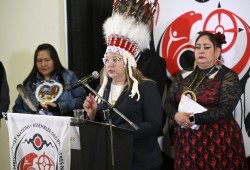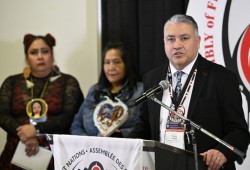Amid cries that a new government in Ottawa is steamrolling over Indigenous rights to get national projects built, today the Assembly of First Nations hosted a forum on what to do about Bill C-5.
The online meeting was open to Canada’s First Nation leaders, exactly two weeks after the Building Canada Act received royal assent. Bill C-5 enables the federal government to identify projects that are in the “national interest” to strengthen Canada’s economy. According to the legislation, these projects are selected after consultations with provinces and Indigenous rights holders, a national prioritization that aims to create more certainly for development and attract investment. The intent is to ensure that these “nation building” projects complete a federal review within two years, according to the act, enabling a “one project, one review” approach that streamlines assessments and approvals.
Information on the act released by the federal government states that a main projects office with be supported by an Indigenous advisory council, but this will not replace consultation with rights holders. Indigenous consultation is mandated by the legislation, if such a community “may be adversely affected by the carrying out of the project”.
But this is not enough to assure many Indigenous leaders that Bill C-5 will follow Canada’s commitment to protect First Nations rights, particularly the “free, prior and informed consent” stipulation within the United Nations Declaration of the Rights of Indigenous Peoples. Cindy Woodhouse Nepinak, national chief of the Assembly of First Nations, noted that Senator Paul Prosper introduced an amendment to include this language in the bill, but despite the support of 27 others senators, this addition did not pass when Bill C-5 went through the red chamber.
“This hard discussion is moving to the next stage, but the honour of the Crown is still at stake,” said Nepinak in a statement. “Canadians and parliamentarians should know that First Nations are united. Our rights are not for sale.”
The B.C. Assembly of First Nations said the bill was rushed through the House of Commons without adequate consultation.
“This is a step backwards in the relationship between the federal government and First Nations,” said BC AFN Regional Chief Terry Teegee. “Just a few years after making the UN Declaration national law, the federal government is giving itself the authority to define what is in First Nations’ interests. The Trump administration will be gone in four years, but the damage this bill will do to First Nations rights and environmental protections will last generations. This isn’t crisis response, it’s opportunistic authoritarianism.”
Bill C-5 follows other recent legislation passed by provinces that aim to empower the Canadian economy amid a strained relationship with its largest trading partner. In B.C. this includes the Infrastructure Projects Act, which was passed in late May with a razor-thin vote in Victoria. Bill 15 is designed to cut delays in getting major projects built, speeding up approvals for developments that are “designated as provincially significant”. The act came into law within a month of it being introduced.
Then Canada’s most populated province passed Bill 5 in early June, the Protecting Ontario by Unleashing Our Economy Act. This legislation allows the Ontario government to create “special economic zones” where projects can be exempt from laws and regulations.
Nuu-chah-nulth Tribal Council President Judith Sayers expects to see this trend continue across the country.
“It such a devastation to the relationships we have with both B.C. and Canada,” she said of the recent legislation. “We’re still looking for free, prior and informed consent from First Nations people. Consulting or having a group see it doesn’t come close to that. It’s our rights that are going to be trampled on by infrastructure projects. They could destroy streams or habitat, it’s just not enough.”
Meanwhile, the United States’ election of Donald Trump in November has rattled public sentiment in Canada, as the cantankerous president has threatened devastating tariffs and even questioned the purpose of Canada’s independence as a nation. Since Trump took office in January his administration has imposed a 10 per cent tariff on Canada’s energy products, along with a 25-per-cent import tax on other goods not covered by the US-Canada-Mexico free trade agreement. The latest in a constant array of threats from the unpredictable president is a 50-per-cent levy on copper.
This dynamic likely helped Prime Minister Mark Carney secure a minority government win in April after assuming the party’s leadership the month before. But some question if his government’s approach to bolster Canada’s economy is already going too far.
“This is another example of a Crown government exploiting the crisis in the relationship with the United States to concentrate power,” stated the B.C. AFN. “We saw the B.C. government do this with Bill 15 and the Ontario government with Bill 5.”










